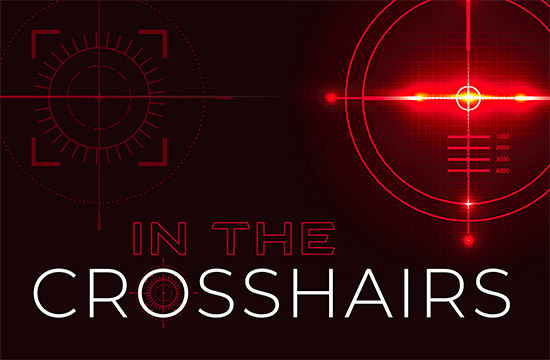
August-
September 2022
Give Me That Mountain!
------------------
|





In the Crosshairs
By Paul Harrison
As followers of Christ, we are both witnesses to and combatants in a great war.
A massive, dark army is surging across the world, leaving devastation in its wake. Ruthless and malignant, the battle presses forward, seeking to bend all to the evil will of its master. Every follower of Jesus is in the crosshairs, and many are falling. Individual believers, churches—even entire denominations—are succumbing to
this mighty force.
In earlier days, the soldiers in this army sought to advance through subterfuge and subtlety. One needed a discerning eye to ascertain their point of attack. That day is past. Today, they boldly press the fight, demanding nothing short of complete submission. They would have us embrace their ideology, forsake our commitment to God’s Word, and undermine the moral code the Almighty wrote with His own finger. Be not deceived! They would have us deny the very Lord whose blood bought us.
Some, squeamish of battles and blood, wish an exemption from warfare and seek fields of service where none slay nor are slain. No such fields remain. The battle pursues us. It will find us and reveal our fight or lack thereof. Thomas Hardy wrote of “the vast middle space of Laodicean neutrality.” Perhaps you recall Laodicea, the church “neither cold nor hot,” but tepid as the Latin Vulgate described it. They sought a neutral, non-extreme, middle position. How tragic that Hardy’s experience led him to employ the adjective “vast” to describe this neutral space. But know this: to be neutral is to capitulate to the enemy. Our Master and Commander calls us to be hot in His service. Otherwise, to use John’s words, He will spew us from His mouth in disgust.
In that context, we are not observers but soldiers, men and women who take up swords and shields in this great conflict. We must be clear, however, as to how we fight. Paul explained the weapons of our warfare are not flesh, not physical, but spiritual. Thought, argument, and spirit translated into life—these are the weapons we employ. With godly minds and holy lives, we march into battle. The prophet Micah masterfully summarized our orders: “He hath shewed thee, O man, what is good; and what doth the Lord require of thee, but to do justly, and to love mercy, and to walk humbly with thy God?” (6:8)
In our warfare we must act justly. Living right, performing justice, maintaining honesty and integrity—these are powerful weapons in the hands of God. With these, He defeats and shames the enemy. Evil ones, even against their will, see our good works and glorify our Father in Heaven. How difficult it is to live out our faith in righteousness, for none other than self and Satan and society oppose us.
In Les Miserables, perhaps the greatest of all novels, lead character Jean Valjean steals a loaf of bread to feed his starving family and, as a result, lands in prison. After unreasonable years in jail, he escapes and encounters a holy priest who leads him to faith. He changes his name and carves out a new life for himself, one surrounded with affluence and prestige as a mayor. He exemplifies integrity and stands for goodness. Yet, his past pursues him. He learns one day an old convict friend of his has been mistaken for him.
Ah, here’s the test. To do nothing would save himself but leave his friend to face injustice. To identify himself would cost everything. On the battlefield of life, integrity often comes at a high price, even the price of life itself. Rest assured, the benefits of a clear conscience far exceed the expenditure, no matter the cost. Conversely, sin and compromise—no matter the bargain they promise—ultimately will prove a most unwise purchase. Knowing this, Jean Valjean turned himself in. In our fight, we must act justly.
Micah reminds us we are required to love mercy. Followers of Jesus must emulate His example. Our Lord saw the destitute and loved them. He encountered the fallen and reached out His blessed helping hand. He embraced the guilty and offered forgiveness. God loves acts of mercy and expects them from His children. All will know we are Christians by our love.
In a discussion of warfare, the idea of employing mercy as an armament seems most strange. But let me tell you, kindness is a powerful weapon. It pierces hearts like no other. Remember, there’s power in the Cross, and the Cross dripped with mercy.
At my father’s funeral three years ago, I told listeners Dad grew up in poverty. He and his ten siblings often went to bed hungry. They did without and that included adequate clothing. For years, Dad wore threadbare shirts and pants. In his early teen years, when the soles of his shoes would break loose from the uppers, he would trim a section from an old bicycle inner tube, stretch it around the shoe, and tie the sole and upper together again. Once when walking home, his makeshift repair snapped, causing the sole to flap loosely and noisily on the sidewalk with every step.
Dad’s Sunday School teacher was Mr. McFall, an employee at the nearby glass plant. He was sitting on his front porch that day when dad’s shoes broke and started making a racket. “Here, Harrold,” he said. “What’s all that noise?” After my father explained, McFall said, “You go down to the store on Main Street, tell them to give you a pair of shoes, and put it on my bill.”
Dad did as he was told and soon sported new footwear. Every quiet step in those shoes announced loudly to my father the overwhelming power of kindness.
Not long after that day, Mr. McFall died. From one perspective, it was just another death in that small Oklahoma town. To my dad, it was a day of great sorrow. He recalled: “I thought God had died.”
Mercy possesses great power.
In our battle, we employ God’s weapons, however strange they seem. We act justly, we show mercy, and we walk humbly with our God. It’s interesting Micah didn’t say we walk humbly before others. Surely, we do that, but that’s not what the prophet said. We walk humbly with our God. Perhaps it’s so worded because the appropriateness of humility shows up most clearly when we are compared with God. He is righteous. We are sinful. He is almighty. We are weak. He is the Creator. We are the created.
Again, surprisingly, humility carries great force. We foolishly swell up and want to display diplomas and resumes, thinking if others only know who we are and what we have accomplished, they will really be impressed. Sharing the lowly truth about ourselves, that we are merely redeemed sinners, merely recipients of grace, merely people who need forgiveness—such humble acknowledgements will impact them much more. Jesus said, “Come to me,” and they came because He was meek and lowly.
Harvard graduate Samuel Sewall began keeping a diary in 1673. Over the years, it described his publishing business, his election as judge, and his rise to chief justice of the Massachusetts Supreme Court. He regularly dined with governors and other influential people. Unfortunately, in our day, he is most known for being one of the judges during the Salem Witch Trials.
Though apparently uneasy about the trials, nonetheless Sewall was involved in the court’s decisions. In the aftermath of those horrible days, his Christian conscience chastened him. He became convinced he had been an instrument of gross injustice. Perhaps all the judges felt such remorse, but for Sewall, remorse was not enough.
What does a dignitary do when convinced of a serious misstep? We all know they usually vacillate, equivocate, blame others—anything but own up to wrongdoing. How many times does pride sit on the throne of our hearts and dictate the terms of our response! This would not do for Sewall. On January 14, 1697, at church he handed a note to his pastor and asked him to read it to the congregation. With Judge Sewall standing, the preacher read the following:
Samuel Sewall, sensible of the reiterated strokes of God upon himself and family; and being sensible, that as to the Guilt contracted…at Salem…Desires to take the Blame and Shame of it, Asking pardon of Men, And especially desiring prayers that God, who has an Unlimited Authority, would pardon that Sin and all other his Sins; personal and Relative: And...Not Visit the Sin of him, or of any other, upon himself or any of his, nor upon the Land.
Now, that is Christian humility. That is walking humbly with our God.
In this battle for God’s Kingdom, while others surrender, the Lord calls us to stand and fight—to take up the unusual yet powerful arms of justice, mercy, and humility and to wield these healing weapons until all bow at Christ’s feet.
So, fellow soldiers, charge into the fray. Fight in the classrooms. Fight in offices. Fight in pulpits. Fight in the halls of justice. Fight in America and fight overseas. Wherever God Almighty places you, take up His arms and empowered by His Spirit, fight!
*Adapted from a commencement address delivered at Welch College
About the Author: Paul V. Harrison has pastored Madison FWB Church in Madison, Alabama since 2015. An adjunct church history and Greek professor at Welch College for 17 years, Paul is the creator of Classic Sermon Index, a subscription-based online index of over 66,000 sermons, with clients including Harvard, Baylor, and Vanderbilt, among others: classicsermonindex.com.
|
|

